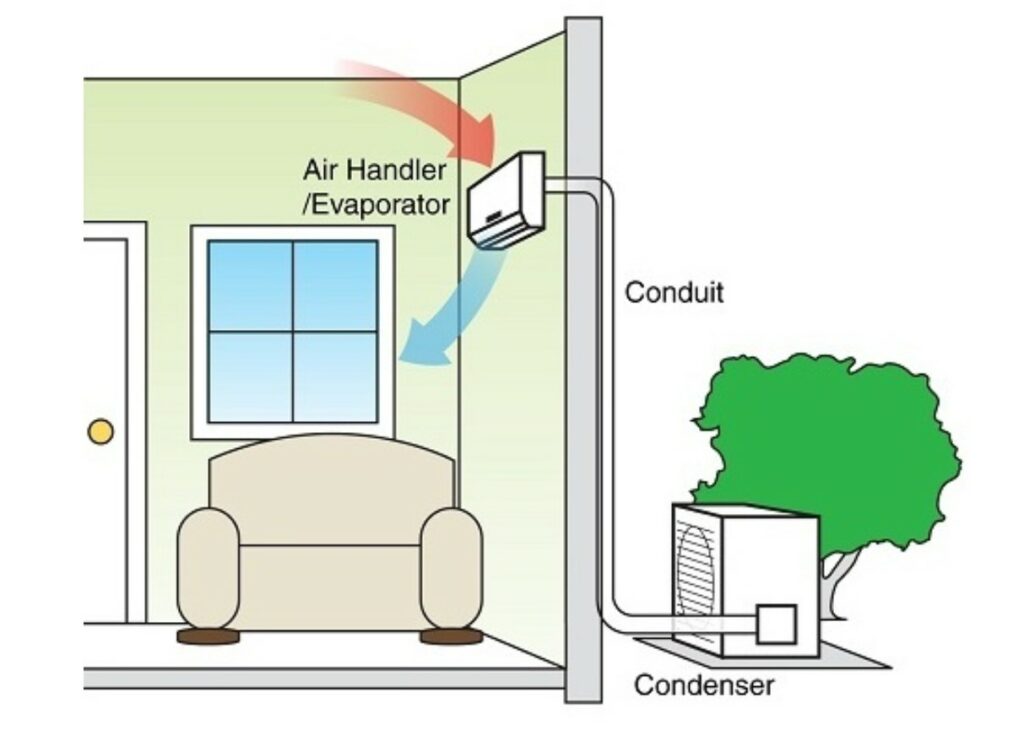There are many different types of AC units out there, including PTAC, unitary, window, portable, split, ductless, central, and so on. With so many options, how do you decide which is the best option for your home?
No matter the type of air conditioner unit you have, it will rely on the same 5 basic elements to produce cool air throughout your home:
- Refrigerant
- Compressor
- Condenser
- Expansion valve
- Evaporator coil
Still, there will be a number of variances based on the AC unit you select.
We are going to explain 4 of the most common types of air conditioning units, along with the pros and cons for each. This article will do a good job of educating you on some of the important features each type of air conditioner offers.
Central Air Conditioner
Central air conditioning includes an intricate series of ducts and fans built into the walls of your home, offering you air conditioning at the flick of a switch. For the highest quality of consistently cool air, central AC is the go-to system. The only way to ensure your central AC adequately cools your entire home is to have a system installed that is fit to your square footage.
Central AC units have two components. The first is a large box that sits outside and is responsible for housing the compressor, condensing fan, and condensing coils. The second component is called the evaporation unit and is generally located in your furnace’s plenum. This location allows the AC to share the same ductwork as your furnace. Here, the expansion valve and evaporator coil go to work.
Read Our Central AC Reviews
Central AC Pros & Cons
Pros
- Very little maintenance is required, and central AC systems can last for many years.
- Since central AC systems include air filters, the air spread throughout your home is better purified.
- A programmable thermostat helps maintain your electric bill as well as the temperature in your home.
Cons
- Central AC is low maintenance but should not be mistaken for needing any maintenance. The filters and air ducts must be regularly cleaned, or else you risk a build-up of mold and mildew.
- Initial installation of a central AC unit can be a costly investment.
Window Air Conditioning Unit
This type of unit is often referred to as a “unitary” AC system, as it is a self-contained system placed through a hole in an exterior wall or in a window. Since adding a hole through your wall is not the easiest task, these units are most often placed in windows. All the 5 refrigeration components are contained in this one box, allowing cold air to blow out one side and warm air to blow out of the other side.
Window AC Unit Pros & Cons
Pros
- Window AC units allow you to quickly cool down one room instead of having to cool down your entire house.
- Cost-effective
- Very easy to install
Cons
- Since an intruder can push aside a window unit and break in through the opening, window AC units come with some security concerns.
- These units can get nosy, especially when the compressor is running.
Portable Air Conditioning Unit
Just like window air conditioners, portable units are also self-contained and can blow cool air out of one side and hot air out of the other side. This type of system can be set directly on the floor and access outside air through a hose or vent extended through a nearby exterior wall. If you have a room that gets so warm the central AC does not properly cool it down, the portable AC unit can be beneficial.
Read Our Portable AC Reviews
Portable AC Unit Pros & Cons
Pros
- You can move the AC unit to the area you need it most, as newer units are easy to roll around.
- Energy and cost-efficient
- Ready to go without any installation
Cons
- Generally, portable AC units cost a little more to install than window ac units, although they provide about the same cooling power. Some find the convenient portability and free window space worth any surcharges.
- Since portable AC units sit directly on the floor, some find it obtrusive or an eyesore.
- Tend to be noisy.
Ductless Mini-Split Air Conditioner
Officially referred to as a “packaged terminal air conditioner,” PTAC is a 2-part system connected through the wall using a refrigerant tube. One part is located outside of the building and contains the condenser, condenser fan, and compressor. The other part of the unit is located inside and contains the components for cooling and distributing air.

Read Our Ductless AC Reviews
Ductless AC Pros & Cons
Pros
- Energy-efficient because they don’t include any ductwork. This means that the thermal air loss associated with central AC systems is avoided. In fact, the U.S Energy Star program gives ductless AC units the Energy Star approval since it can reduce your heating and cooling expenses by as much as 30%.
- You can hang this system from the wall or leave it free-standing on the floor, giving you more options design-wise.
- Ductless systems tend to be safer because they do not leave a hole large enough for intruders to take advantage of. Also, they do not utilize combustible fuels.
- The thermostat helps regulate temperatures.
- Since the compressor can be located 16 meters from the actual unit, ductless AC tends to be quiet.
Cons
- Installation is more complex and costly, and units generally cost more as well.
- Best at cooling small spaces, as opposed to your entire home.
- If a ductless AC is not properly set up, it will cause your electric bill to increase.
If you are in the market for an air conditioner, you may be wondering which AC type will serve your needs the best. When you decide whether you want to go with a central AC, window, ductless, or portable one, it will depend on many factors that are relevant to you and your family’s needs. Go with the unit that meets your cooling needs for the necessary rooms, choose the one that offers you the most convenience, and choose one that fits your budget.






